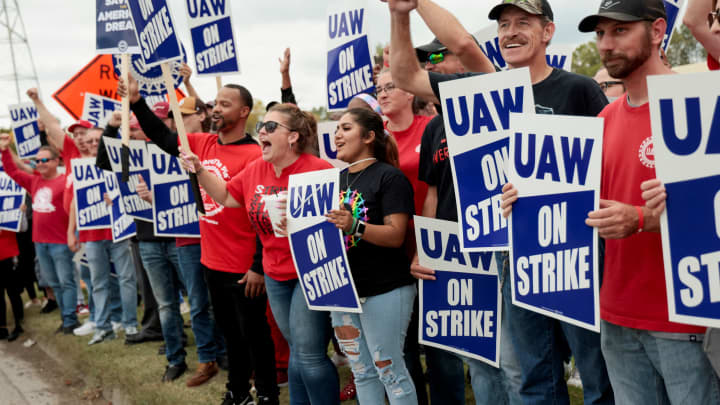
DETROIT — Labor strikes are now an international issue for after the Detroit automaker failed to reach a tentative agreement by Monday for roughly 4,300 workers represented by .
The Canadian autoworkers will join roughly 9,200 United Auto Workers members who at two assembly plants and 18 parts and distribution centers for GM. The U.S. strike and has since expanded.
The new strikes in the Canadian province of Ontario affect an assembly plant that produces light- and heavy-duty trucks; production of some V-6 and V-8 engines used in a variety of vehicles such as the Chevrolet Equinox; and a stamping facility that produces parts for various cars and trucks.
Unifor National President Lana Payne said GM "continues to fall short on our pension demands, income supports for retired workers, and meaningful steps to transition temporary workers into permanent, full-time jobs."
Unifor, which represents 18,000 Canadian workers at the Detroit automakers, took a more traditional approach to its negotiations than its U.S. counterpart. The Canadian union is negotiating with each automaker separately and using a deal first as a "pattern" for GM and Chrysler parent .
Payne said early Tuesday that GM is "stubbornly refusing to meet the pattern agreement."
GM, in a statement, said the company is "disappointed" that a deal couldn't be reached following "very positive progress on several key priorities over the past weeks."
"We remain at the bargaining table and are committed to keep working with Unifor to reach an agreement that is fair and flexible," .
Ford's three-year deal included hourly wage increases of up to 25%, reactivation of a cost-of-living allowance to battle inflation and a shorter progression for workers to reach top pay, among other new or altered benefits.
The agreement, which covers more than 5,600 workers at Ford facilities in Canada, was of workers who voted.
That traditional patterned bargaining approach runs counter to the UAW's new strategy of bargaining at once.
The UAW has been gradually increasing the strikes since the work stoppages began, after the sides failed to reach tentative agreements by Sept 14. The targeted, or "stand-up," strikes are taking place instead of national walkouts in which all plants simultaneously strike.
Only 25,200 workers, or roughly 17% of UAW members covered by the expired contracts with the Detroit automakers, are currently on strike. UAW President Shawn Fain previously said the union would increase the work stoppages based on progress in the negotiations.
Thousands of other UAW members have been laid off as a result of the strikes, including roughly 2,175 workers at other GM facilities. Most notably, the Detroit automaker was forced to idle production of a Kansa assembly plant that produces Chevrolet Malibu sedans and Cadillac XT4 crossovers.




